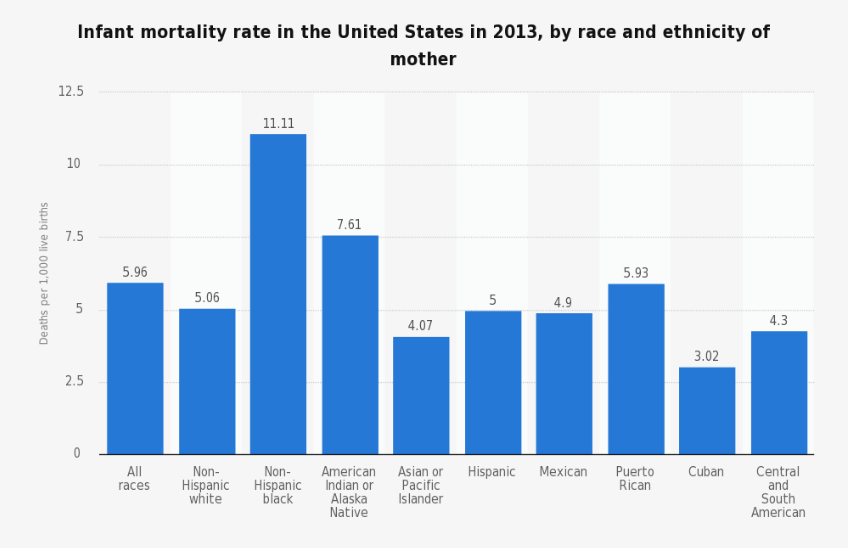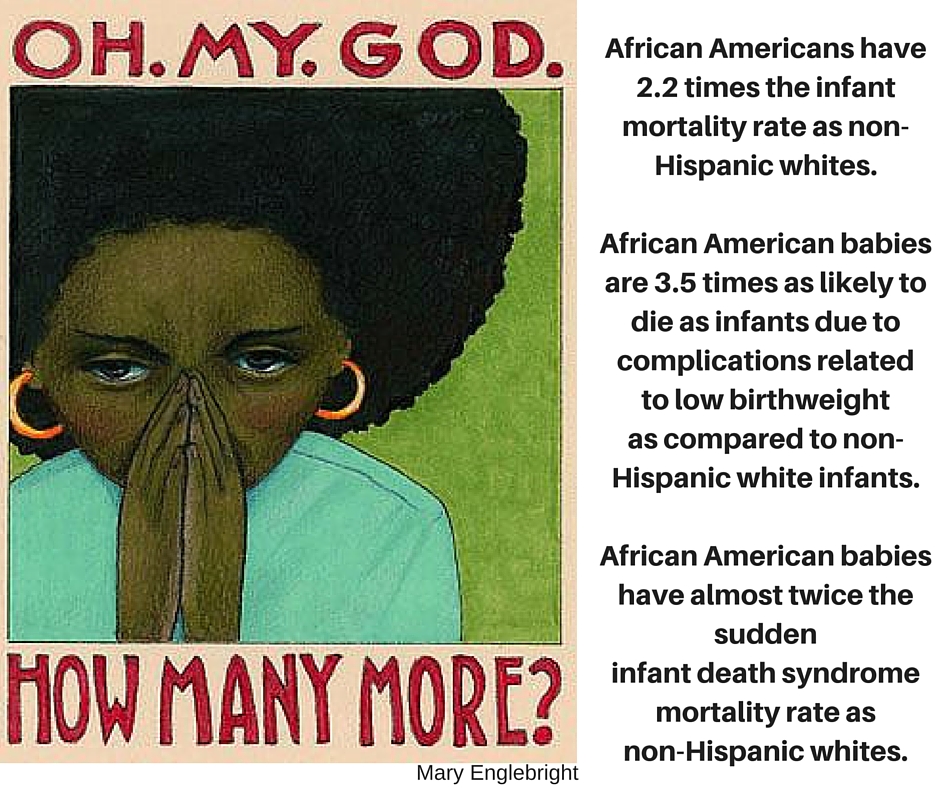Facts: The Infant Mortality Rate
Non-Hispanic Black 11%
Non-Hispanic White: 5.1%
(CDC 2015)
This is for my white friends, the 1,000+ white families who have taken my Lamaze childbirth classes, my white birth professional colleagues and anyone else who will listen. Because my black friends, black childbirth educators, and black doctors, midwives and nurse colleagues already know these facts. It is nothing new or groundbreaking, and they don’t need to hear it because they are living it. But you need to hear it. The undeniable facts below clearly underscore the need for the national Black Lives Matter movement happening right now.
Nationwide and locally, African-American women experience the worst birth outcomes than any other major ethnic group, by far. Black infants are between two-and-a-half to three times more likely to die within their first year than white infants, due largely to premature birth, low birth weight or birth defects. It’s a disparity that has existed as long as health officials have kept statistics, and it’s both troubled and confounded them.
On the surface, the reasons might seem intuitive. African-Americans tend to experience poverty at higher rates than whites, and have less access to health care. Researchers that study racial disparity know that there is a strong association between class and health. However, this does not explain everything.
Infant mortality for blacks is not only high when compared with white s. It’s also more than double the rate recorded among Latinos, despite the fact that Latinos in the United States also tend to experience poverty and health problems at elevated levels in comparison to blacks.
s. It’s also more than double the rate recorded among Latinos, despite the fact that Latinos in the United States also tend to experience poverty and health problems at elevated levels in comparison to blacks.
Other research has shown that the risk of poor birth outcomes does not diminish as a black woman’s socioeconomic status improves.
There is an emerging theory that black women, regardless of socioeconomic status, are simply exposed to more psychosocial stress.
Stress produces hormones that play a significant role in triggering labor in pregnant women. And in black women, the chronic elevated buildup of stress hormones may trigger early labor and other pregnancy problems.
For poorer black women, elevated stress may come from dealing with poverty, unstable home environments and families. For middle to upper-class black women, from having to work harder to prove themselves at work and having to battle preconceived notions about their abilities.
But across all income levels, black women experience high levels of stress due to racism.
Over time, elevated stress from all of these social factors combined has a chronic, long-term effect that takes a toll on black women’s bodies.
Because of these and many more reasons, Homegrown Babies is committing to be an ally and a comrade in the Black Lives Matter Movement. While the biological authenticity of race remains a contentious issue in relationship to infant mortality rates, the social significance of race is indisputable.
At Homegrown Babies, we know and honor that every baby’s life matters in this world. However when we say all lives matter, which in and of itself is a true statement, and yet it is a statement that is not allowing us to look more closely at why black babies, black mothers and black families are suffering such high infant mortality rates. We cannot diminish, avoid, deny or change the facts that African American babies continue to die at significantly higher levels than all other races. These babies’ mothers, fathers and families carry an enormous amount of stress and anxiety due to many social and economic factors, which include racism, that strongly influence both their infant and even maternal mortality rates.
The chronic stress of racism and the social inequality it engenders magnify all other underlying social determinants of persistent racial disparities and are undeniable in a black woman’s personal health and the health of her baby.
Homegrown Babies and I are committed to the Black Lives Matter movement by not only naming the problem of racial disparities in adverse birth outcomes, but also through educating the white public on the multidimensional nature of racism. We, as white people, cannot be bystanders in these inequalities. We need to actively support and be involved in change at local and national levels for the African American Community, exposing and changing the pathways by which racism adversely affects the health and well being of all black families in our communities.
This Piece is based strongly on the work of Tyan Parker Dominguez:
https://sowkweb.usc.edu/faculty/tyan-parker-dominguez
http://www.scpr.org/news/2014/03/03/42483/why-do-black-infants-die-so-much-more-often-than-w/
And cites statistics from the following studies and references:
https://www.acog.org/-/media/Departments/Public-Health-and-Social-Issues/Racial-And-Ethnic-Disparities-In-Maternal-Mortality-InThe-US.pdf?la=en
http://www.cdph.ca.gov/Pages/NR14-006.aspx
http://www.ncbi.nlm.nih.gov/pubmed/18463466
http://www.ncbi.nlm.nih.gov/pubmed/18377138
http://www.ncbi.nlm.nih.gov/pubmed/18463466
http://publichealth.lacounty.gov/mch/LACALC/LACALC_AboutUs.htm



